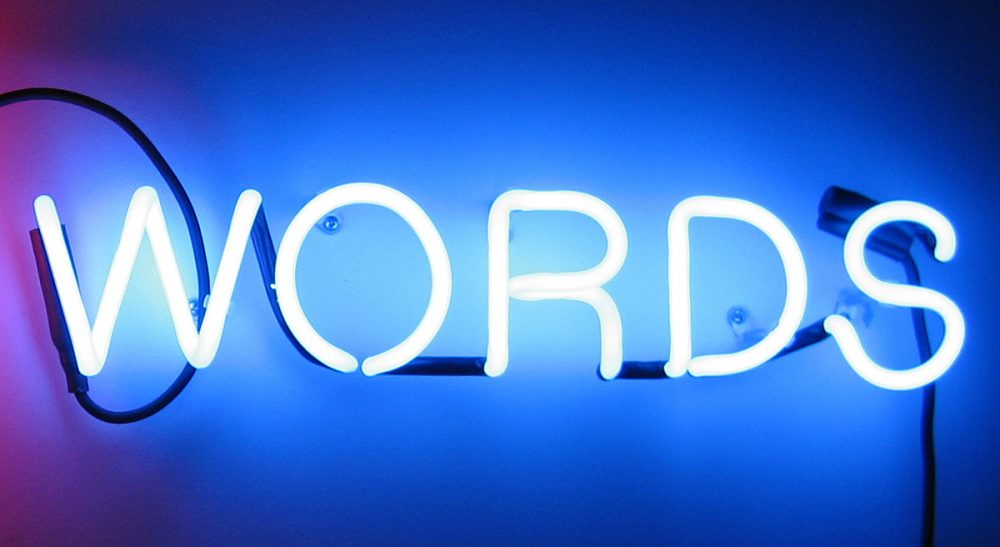Advertisement
For The Love Of Language, A Linguistic New Year's Resolution
Resume
George Carlin was famous for his monologue, “Seven Words You Can Never Say on Television.” The idea was valid and very funny at the time, although it seems quaint in these days of anything-goes cable. I do think there are some words we could do without, at least temporarily.
I was okay with curated fashions and even curated books in a home library. But when I read that someone was provided with carefully curated snacks, I’d had enough.
I have a list of seven words that I’ve resolved to give up for the New Year. They’re not George Carlin’s seven words. They're not so-called dirty words or swear words. They’re not ones that can’t be said in polite company or on family-friendly TV. Rather, they are words that are misused, overused or just plain annoying. I’m renouncing the use of these words — in conversation and in print — for at least a year. By then, I think that, like a dish I haven’t eaten in a long time, when I try them again, they may seem fresh and new. Or perhaps I won’t have missed them, and they will be gone for good.
My seven words:
Curate. I was okay with curated fashions and even curated books in a home library. But when I read that someone was provided with carefully curated snacks, I’d had enough. Curate means to look after and preserve. Thus the curator of art in a museum curates the collection. The curate in your church is entrusted with looking after your soul.
The Oxford English Dictionary extends the word’s use to someone who selects performers to be included in a festival or program. I do not think the OED means to extend that usage to granola bars.
Amazing. These days, people call everything, from films to the weather to their friends, amazing. The word that once meant “to stun or stupefy – as by a blow on the head,” according to the OED, now seems to mean pretty good. Nearly everyone overuses amazing, but a waiter at a restaurant in my neighborhood is shameless. He pronounces every dish on the menu “amazing.” Whether you order a salad or the evening special, he says, “It’s amazing.” He’s not the only one. He’s just the one I notice most.
When everything is amazing, nothing is.
Icon, iconic. An icon was once a likeness or an image. It came to mean, “Designating a person or thing regarded as representative of a culture or movement; important or influential in a particular (cultural) context,” according to the OED. And it can also be used to indicate symbols, like the trash basket on your computer.
However, calling a new and hitherto unheard-of fashion company, soft drink, snack food or shampoo “iconic” is a leap too far.
Entrepreneurial. It used to be that only entrepreneurs, i.e., risk-taking business people, were expected to be entrepreneurial. Now, no matter how bureaucratic or conventional a business may be, its employees are directed to be entrepreneurial – within the parameters of the organization, of course.
When someone in a risk-free position, such as an assistant librarian at a community historical society, is expected to act like an entrepreneur, it’s time to give that word a rest.
Artisan, artisanal. All sorts of things are being called artisanal lately. Even mass-produced giftwrap. An artisan is a craftsperson, one engaged in traditional or small-scale methods. So cheese may be artisanal. Hand-knitted sweaters may be artisanal. But packaged bread mixes made by Pillsbury are not. No matter what the labels say.
Since I am not a cow or General Motors, I intend to steer clear of branding.
And, contrary to a recent article in Psychology Today, there is no such thing as “artisan parenting.”
Branding. Since I am not a cow or General Motors, I intend to steer clear of branding. A brand is a product or a painful mark burned onto an animal. Yes, it can be an immediately recognized impression, but it can also be a sign of disgrace.
Wouldn’t you rather be an individual than a brand?
Foodie. Enough said.
Feel free to join me in giving up these words. Or come up with your own list. There is certainly no dearth of words we’d be better off without, at least for the coming year. How about trending? Or viral? Selfie? Locavore?
